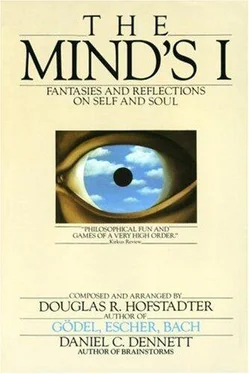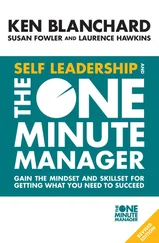ACHILLES: Oh, Mr. T, for once you have let me down. I was sure that you, who always see the most deeply into things, would be able resolve this dilemma—but apparently, you have seen no further than I myself saw. Oh, well, I guess I should feel pleased to have seer far as Mr. Tortoise, for once.
TORTOISE: I beg your pardon, but my eyesight is extremely fine. Please look again, and then tell me if the picture doesn’t say what I said says.
ACHILLES: But of course it does! You have merely repeated my own original observation.
TORTOISE: Perhaps “MU” exists in this picture on a deeper level than imagine, Achilles—an octave lower (figuratively speaking). But now I doubt that we can settle the dispute in the abstract. I would like to see both the holistic and reductionistic points of view laid more explicitly; then there may be more of a basis for a decision. I would very much like to hear a reductionistic description of an colony, for instance.
CRAB: Perhaps Dr. Anteater will tell you something of his experiences in that regard. After all, he is by profession something of an expert on that subject.
TORTOISE: I am sure that we could learn much from a myrmecologist you, Dr. Anteater. Could you tell us more about ant colonies, from a reductionistic point of view?
ANTEATER: Gladly. As Mr. Crab mentioned to you, my profession has me quite a long way into the understanding of ant colonies.
ACHILLES: I can imagine! The profession of Anteater would seem to be synonymous with being an expert on ant colonies!
ANTEATER: I beg your pardon. “Anteater” is not my profession; it is species. By profession, I am a colony surgeon. I specialize in correcting nervous disorders of the colony by the technique of surgical removal.
ACHILLES: Oh, I see. But what do you mean by “nervous disorders” of an ant colony?
ANTEATER: Most of my clients suffer from some sort of speech impairment. You know, colonies which have to grope for words in every situations. It can be quite tragic. I attempt to remedy the situation by, uhh—removing—the defective part of the colony. These operations are sometimes quite involved, and of course years of study are required before one can perform them.
ACHILLES: But—isn’t it true that, before one can suffer from speech impairment, one must have the faculty of speech?
ANTEATER: Right.
ACHILLES: Since ant colonies don’t have that faculty, I am a little confused.
CRAB: It’s too bad, Achilles, that you weren’t here last week, when Dr. Anteater and Aunt Hillary were my house guests. I should have thought of having you over then.
ACHILLES: Is Aunt Hillary your aunt, Mr. Crab?
CRAB: Oh, no, she’s not really anybody’s aunt.
ANTEATER: But the poor dear insists that everybody should call her that, even strangers. It’s just one of her many endearing quirks.
CRAB: Yes, Aunt Hillary is quite eccentric, but such a merry old soul. It’s a shame I didn’t have you over to meet her last week.
ANTEATER: She’s certainly one of the best-educated ant colonies I have ever had the good fortune to know. The two of us have spent many a long evening in conversation on the widest range of topics.
ACHILLES: I thought anteaters were devourers of ants, not patrons of ant-intellectualism!
ANTEATER: Well, of course the two are not mutually inconsistent. I am on the best of terms with ant colonies. It’s just ants that I eat, not colonies—and that is good for both parties: me, and the colony.
ACHILLES: How is it possible that —
TORTOISE: How is it possible that —
ACHILLES: —having its ants eaten can do an ant colony any good?
CRAB: How is it possible that —
TORTOISE: —having a forest fire can do a forest any good?
ANTEATER: How is it possible that —
CRAB: —having its branches pruned can do a tree any good?
ANTEATER: —having a haircut can do Achilles any good?
TORTOISE: Probably the rest of you were too engrossed in the discussion to notice the lovely stretto which just occurred in this Bach fugue.
ACHILLES: What is a stretto?
TORTOISE: Oh, I’m sorry; I thought you knew the term. It is where one theme repeatedly enters in one voice after another, with very little delay between entries.
ACHILLES: If I listen to enough fugues, soon I’ll know all of these things and will be able to pick them out myself, without their having to be pointed out.
TORTOISE: Pardon me, my friends. I am sorry to have interrupted. Dr. Anteater was trying to explain how eating ants is perfectly consistent with being a friend of an ant colony.
ACHILLES: Well, I can vaguely see how it might be possible for a limited and regulated amount of ant consumption to improve the overall health of a colony—but what is far more perplexing is all this talk about having conversations with ant colonies. That’s impossible. An ant colony is simply a bunch of individual ants running around at random looking for food and making a nest.
ANTEATER: You could put it that way if you want to insist on seeing the trees but missing the forest, Achilles. In fact, ant colonies, seen as wholes, are quite well-defined units, with their own qualities, at times including the mastery of language.
ACHILLES: I find it hard to imagine myself shouting something out loud in the middle of the forest, and hearing an ant colony answer back.
ANTEATER: Silly fellow! That’s not the way it happens. Ant colonies don’t converse out loud, but in writing. You know how ants form trails leading them hither and thither?
ACHILLES: Oh, yes—usually straight through the kitchen sink and into my peach jam.
ANTEATER: Actually, some trails contain information in coded form. If you know the system, you can read what they’re saying just like a book.
ACHILLES: Remarkable. And can you communicate back to them?
ANTEATER: Without any trouble at all. That’s how Aunt Hillary and I have conversations for hours. I take a stick and draw trails in the moist ground, and watch the ants follow my trails. Presently, a new trail starts getting formed somewhere. I greatly enjoy watching trails develop. As they are, forming, I anticipate how they will continue (and more often I am wrong than right). When the trail is completed, I know what Aunt Hillary is thinking, and I in turn make my reply.
ACHILLES: There must be some amazingly smart ants in that colony, I’ll say that.
ANTEATER: I think you are still having some difficulty realizing the difference in levels here. Just as you would never confuse an individual tree with a forest, so here you must not take an ant for the colony. You see, all the ants in Aunt Hillary are as dumb as can be. They couldn’t converse to save their little thoraxes!
ACHILLES: Well then, where does the ability to converse come from? It must reside somewhere inside the colony! I don’t understand how the ants can all be unintelligent, if Aunt Hillary can entertain you for hours with witty banter.
TORTOISE: It seems to me that the situation is not unlike the composition of a human brain out of neurons. Certainly no one would insist that individual brain cells have to be intelligent beings on their own, in order to explain the fact that a person can have an intelligent conversation.
ACHILLES: Oh, no, clearly not. With brain cells, I see your point completely. Only… ants are a horse of another color. I mean, ants just roam about at will, completely randomly, chancing now and then upon a morsel of food.... They are free to do what they want to do, and with that freedom, I don’t see at all how their behavior, seen as a whole, can amount to anything coherent—especially something so coherent as the brain behavior necessary for conversing.
CRAB: It seems to me that the ants are free only within certain constraints. For example, they are free to wander, to brush against each other, to pick up small items, to work on trails, and so on. But they never step out of that small world, that ant-system, which they are in. It would never occur to them, for they don’t have the mentality to imagine anything of the kind. Thus the ants are very reliable components, in the sense that you can depend on them to perform certain kinds of tasks in certain ways.
Читать дальше











